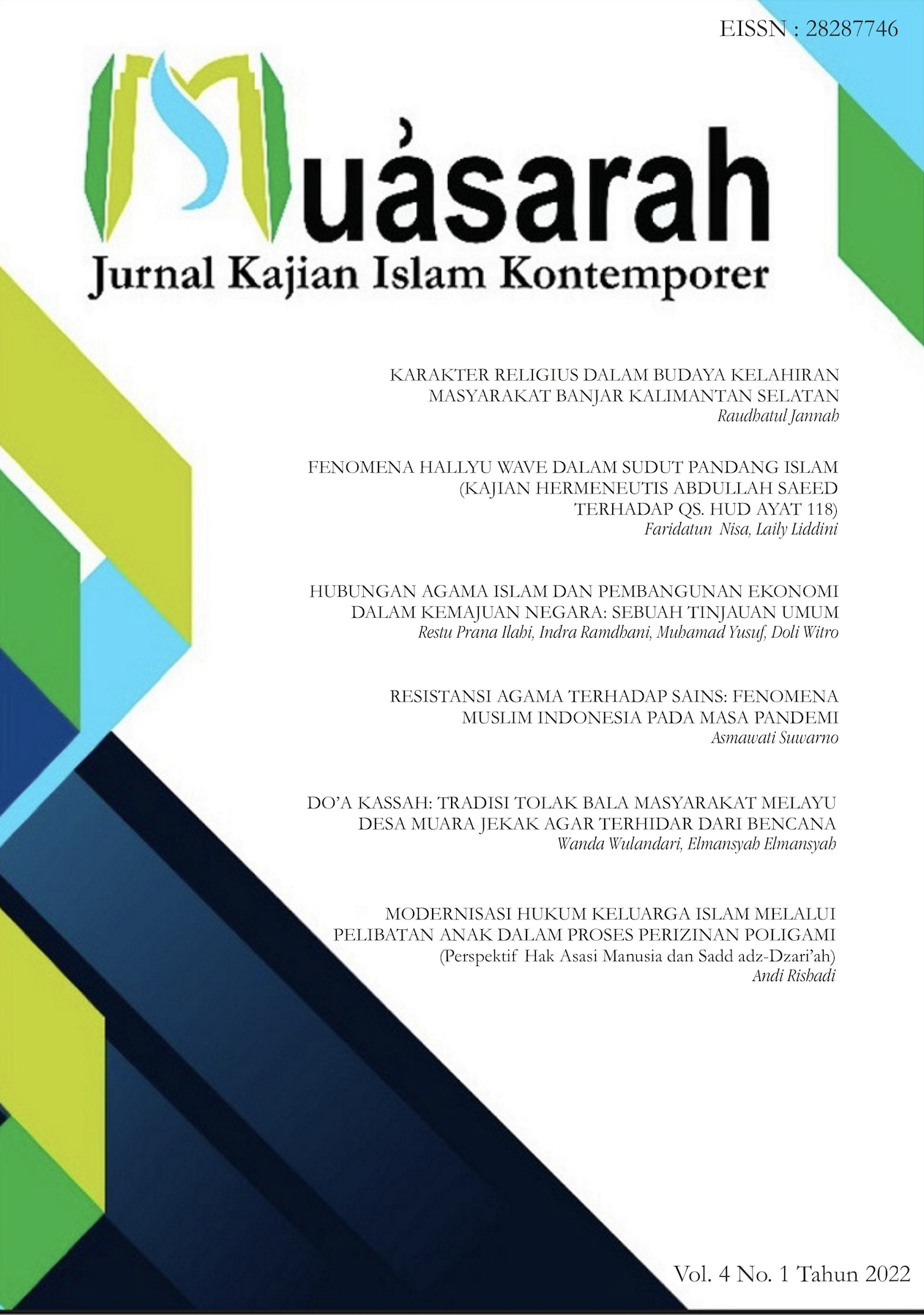RESISTANSI AGAMA TERHADAP SAINS: FENOMENA MUSLIM INDONESIA PADA MASA PANDEMI
DOI:
https://doi.org/10.18592/msr.v4i1.6559Keywords:
Sains, Agama, PandemiAbstract
Abstract: This article aims to analyze science and religion in the context of a pandemic in Indonesia. The interesting thing as well as the topic of the problem in this article is how religion and science explain their role during the pandemic. More specifically, opposition to government policies will be clashed with the religiosity that most Indonesians believe in. Based on the literature study, the results obtained include an excessive understanding of religion that will make people increasingly distrustful of reality. During this pandemic, science and religion must complement each other, both of which are gifts from God. Science is considered as a human domination that is always colonized by worldly interests for people who only care about a vertical relationship to God. The scientific contribution of this article is to explain specifically where religion is the main factor in building community perspectives.Abstrak:Artikel ini bertujuan untuk menganalisis sains dan agama dalam konteks pandemi di Indonesia. Hal menarik sekaligus topik permasalahan dalam artikel ini adalah bagaimana agama dan sains menjelaskan perannya di masa pandemi. Lebih spesifiknya, penentangan terhadap kebijakan pemerintah akan berbenturan dengan religiositas yang diyakini sebagian besar masyarakat Indonesia. Berdasarkan studi literatur, hasil yang diperoleh antara lain pemahaman agama yang berlebihan yang akan membuat masyarakat semakin tidak percaya dengan kenyataan. Di masa pandemi ini, sains dan agama harus saling melengkapi, yang keduanya adalah anugerah dari Tuhan. Ilmu pengetahuan dianggap sebagai dominasi manusia yang selalu dijajah oleh kepentingan duniawi bagi orang-orang yang hanya mementingkan hubungan vertikal dengan Tuhan. Kontribusi ilmiah artikel ini adalah untuk menjelaskan secara spesifik dimana agama menjadi faktor utama dalam membangun cara pandang masyarakatReferences
Abdullah, M. A. (2020). Mendialogkan Nalar Agama dan Sains Modern di Tengah Pandemi Covid-19. Maarif, 15(1), 11–39
Al-Attas, Syed Muhammad Naquib. Prolegomena: To the Metaphysics of Islam. Kuala Lumpur: 2001
Alimardani, M., & Elswah, M. (2020). Online Temptations: COVID-19 and Religious Misinformation in the MENA Region. Social Media and Society, 6(3), 4–7. https://doi.org/10.1177/2056305120948251
Armansyah, M., Putri, M., Yumaini, N., & Astuti, Y. (2021). Persepsi publik terhadap pembatalan haji selama dua tahun berturut-turut. SENKIM: Seminar Nasional Karya Ilmiah Multidisiplin , 1(1), 272–275. https://journal.unilak.ac.id/index.php/senkim/article/view/7916
Barbour, Ian G. When Science Meets Religion. New York: Harper San Francisco. 2000
Brooke, John Hedley. Science and Religion: Some Historical Perspectives. Cambridge: Cambridge University Press. 1998
Haught, John F. Perjumpaan Sains dan Agama: Dari Konflik ke Dialog, terj. Fransiskus Borgias. Bandung: Mizan. 2004
Imaddudin,2001.Studi Persepsi Masyarakat Terhadap Fatwa MUI NO. 14 Tahun 2020 Tentang Penyelenggaraan Ibadah Dalam Situasi Wabah Covid-19. Jurnal Ilmiah Sosiologi Agama. Vol 3 No. 2 (92-133)
Li, W., Yigitcanlar, T., Erol, I., & Liu, A. (2021). Motivations, barriers and risks of smart home adoption: From systematic literature review to conceptual framework. Energy Research & Social Science, 80. https://doi.org/ 10.1016/j.erss.2021.102211
Maliki, M. (2020). Covid-19, Agama, dan Sains. MAARIF Journal, 15(1), 60–92
Utomo, P. (2021). Covid-19 Versus Mudik Telaah Tentang Efektivitas Kebijakan Pelarangan Mudik Lebaran Pada Masa Pandemi Covid-19. Qistie, 14(1), 111–125. https://www.publikasiilmiah.unwahas.ac.id/index.php/QISTIE/article/view/4496
Quadri, S. A. (2020). COVID-19 and religious congregations: Implications for spread of novel pathogens. International Journal of Infectious Diseases, 96, 219–221.
Rachman, F. F., & Pramana, S. (2020). Analisis Sentimen Pro dan Kontra Masyarakat Indonesia tentang Vaksin COVID-19 pada Media Sosial Twitter. Health Information Management Journal ISSN, 8(2), 2655–9129.
S, A. B. (2021). Disrupsi Keagamaan di Masa Pandemi Covid-19 : Tinjauan Sadd Adz - Dzariah terhadap Sikap Masyarakat Kota Parepare dalam Menanggapi Peniadaan Shalat Berjamaah di Masjid. 19, 75–87.
Sari, R. K. (2021). Identifikasi Penyebab Ketidakpatuhan Warga Terhadap Penerapan Protokol Kesehatan 3M Di Masa Pandemi Covid-19. Jurnal AKRAB JUARA, 6(1), 84–94.
Sholeh, M. A. N., & Helmi, M. I. (2021). The COVID-19 vaccination: Realization on halal vaccines for benefits. Samarah, 5(1), 174–190. https://doi.org/10.22373/sjhk.v5i1.9769
Sudirman, S., Gunawan, E., & Rasyid, M. R. (2021). Covid-19 Dan Ibadah ( Resistensi Perubahan Hukum Islam Dalam Mempertahankan Rutinitas Ibadah). Aqlam: Journal of Islam and Plurality, 6(1). https://doi.org/10.30984/ajip.v6i1.1583
(WHO), W. H. O. (2020). Modes of transmission of virus causing COVID-19: implications for IPC precaution recommendations. Geneva: World Health Organization;, Available, 1–10. https://www.who.int/publications-detail/modes-of-transmission-of-virus-causing-covid-19-implications-for-ipc-precaution-recommendations
Wulandari, R., Suwarni, L., Selviana, S., & Mawardi, M. (2021). Pelaksanaan Protokol Kesehatan Covid-19 Pada Tempat Ibadah Di Kota Pontianak. Jurnal Kesehatan Masyarakat, 14(1). https://doi.org/10.47317/jkm.v14i1.32
Yezli, S., & Khan, A. (2020). COVID-19 pandemic: it is time to temporarily close places of worship and to suspend religious gatherings. Journal of Travel Medicine.
Downloads
Published
How to Cite
Issue
Section
License
Authors who publish with this journal agree to the following terms:
- Authors retain copyright and grant the journal right of first publication with the work simultaneously licensed under a Creative Commons Attribution License that allows others to share the work with an acknowledgement of the work's authorship and initial publication in this journal.
- Authors are able to enter into separate, additional contractual arrangements for the non-exclusive distribution of the journal's published version of the work (e.g., post it to an institutional repository or publish it in a book), with an acknowledgement of its initial publication in this journal.
- Authors are permitted and encouraged to post their work online (e.g., in institutional repositories or on their website) prior to and during the submission process, as it can lead to productive exchanges, as well as earlier and greater citation of published work.






